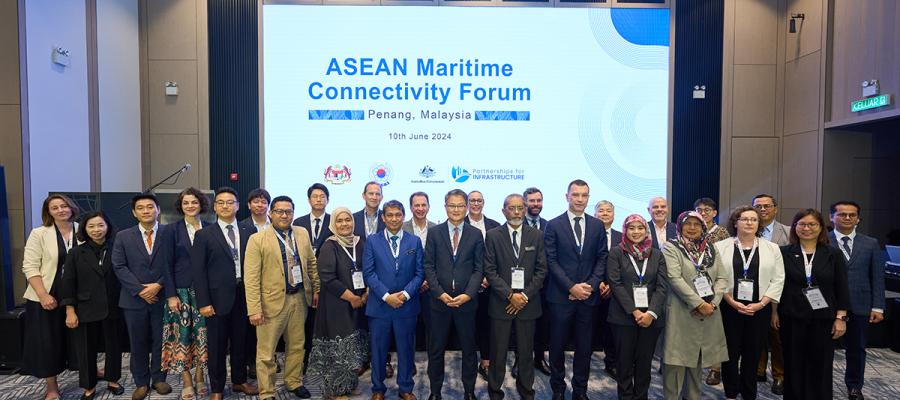If you are interested in partnering with us, please get in touch. Using P4I's flexible, innovative tools and diverse global expertise, we are confident we can design a response that is tailored to your needs.


Green shipping and supply chain management are crucial for Southeast Asian governments as they seek to decarbonise the maritime sector. Using cleaner fuels, optimising routes, and adopting energy-efficient measures can significantly reduce greenhouse gas emissions and the sector’s carbon footprint. This is critical in a region heavily reliant on maritime trade and facing severe impacts from climate change.
Southeast Asia’s strategic location between the Indian and Pacific Oceans – with 9 out of 10 ASEAN Member States (AMS) and Timor-Leste being coastal states – position the region as a hub for global maritime connectivity. The potential for Southeast Asia is nevertheless constrained by underdeveloped cross-border maritime infrastructure, as well as logistics and supply chain limitations which continue to challenge ASEAN’s ambition to become a highly competitive and integrated economic region.
For AMS, improving maritime connectivity is crucial for sustained economic growth. It can bolster the region’s resilience to economic and other shocks, including by promoting stability through strengthened cooperation around shared interests. Key drivers for improved connectivity include creating an enabling policy environment for investment in port and marine logistics technology, risk management and emergency preparedness, digitalisation, climate change adaptation, and enhanced regional partnerships.
The Australian Government is a longstanding supporter of ASEAN’s connectivity agenda and is increasing its focus on the region’s maritime sector. Over the next 4 years, it will invest $64 million, including $40 million in new funding, to enhance Australia's Southeast Asia Maritime Partnerships. As part of Australia's Southeast Asia Economic Strategy to 2040, this initiative aims to extend government-to-government technical assistance and foster collaboration across the region.
Australia is working through Partnerships for Infrastructure (P4I), with ASEAN to advance its maritime connectivity vision and strategies outlined in the ASEAN Transport Strategic Plan of 2016-2025, Master Plan on ASEAN Connectivity (MPAC) 2025, and the ASEAN Outlook on the Indo-Pacific (AOIP). These documents outline ASEAN initiatives to upgrade maritime connectivity, including maritime infrastructure, maritime logistics, port-land connectivity, regional sea-borne trade, and capacity building.
On 10 June 2024, P4I supported Australia to co-host the first ASEAN Maritime Connectivity Forum, together with the Republic of Korea (ROK) and Malaysia, and in close collaboration with the ASEAN Secretariat. The half-day forum was held during the 57th ASEAN Senior Transport Officials Meeting (STOM) in Penang, Malaysia. Around 150 ASEAN STOM leaders and representatives from AMS, Timor-Leste, ROK, and Australia attended the event.
The forum emphasised ASEAN’s commitment to strengthening cooperation and engagement with Australia, ROK, and Malaysia, and reinforced ASEAN centrality in the Indo-Pacific. The key themes were green shipping, supply chain management, port digitalisation and automation. Participants explored the integration of environmentally sustainable practices in maritime transport and logistics, focusing on emission reductions through greener fuels, enhanced energy efficiencies in shipping operations, and optimising logistics operations to minimise environmental impact.
By improving maritime connectivity and integrating green practices, Southeast Asia can ensure long-term trade viability and competitiveness while addressing climate change and fostering sustainable economic growth. Growing cooperation between Australia and ASEAN in this sector is paving the way for a resilient and sustainable future in the maritime industry.
Huge thanks to leading experts who shared their knowledge and insights during the forum:
If you are interested in partnering with us, please get in touch. Using P4I's flexible, innovative tools and diverse global expertise, we are confident we can design a response that is tailored to your needs.
